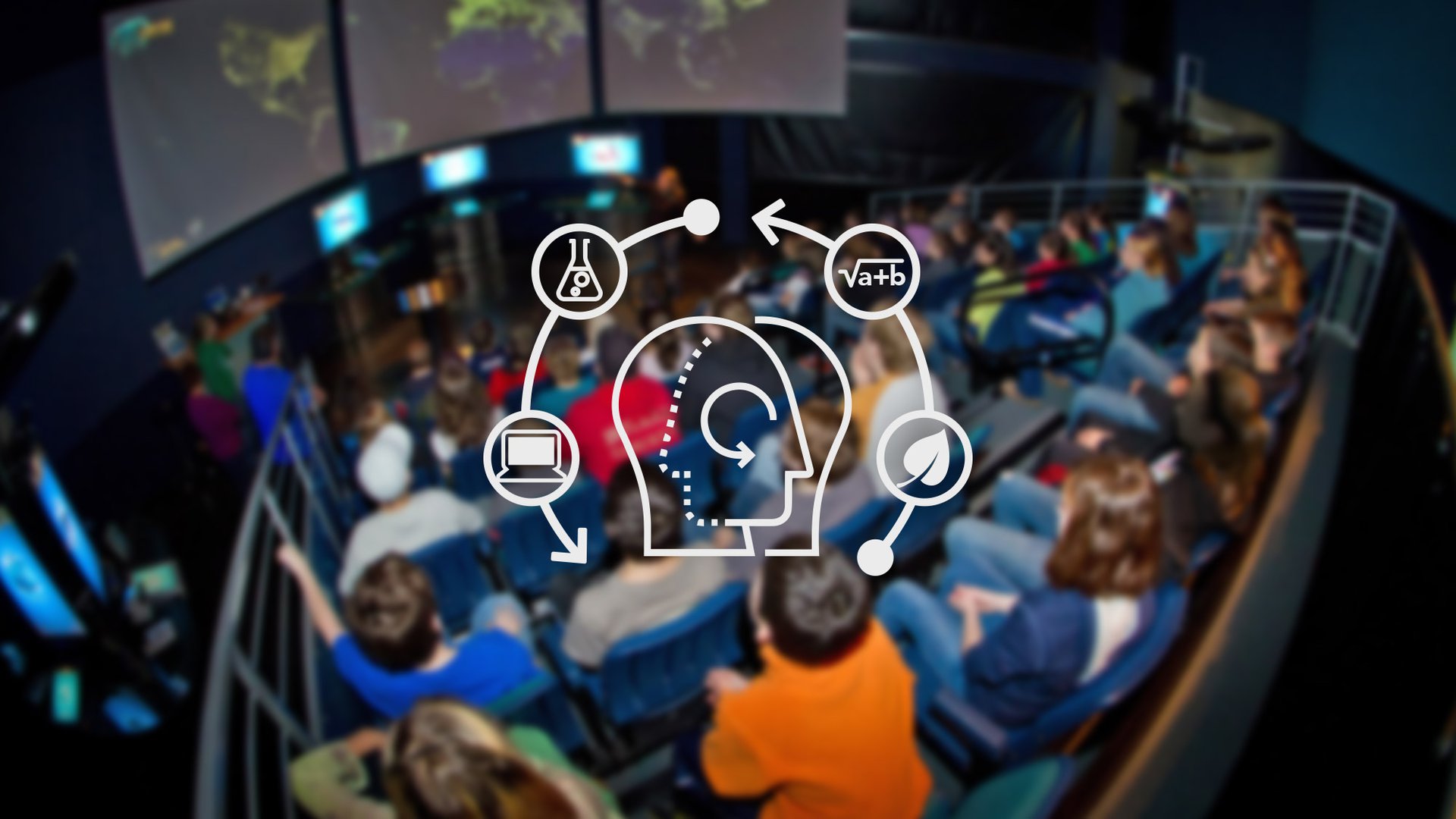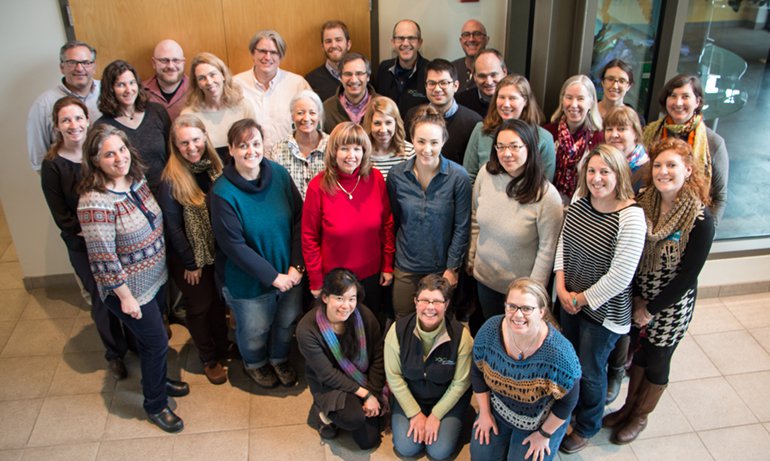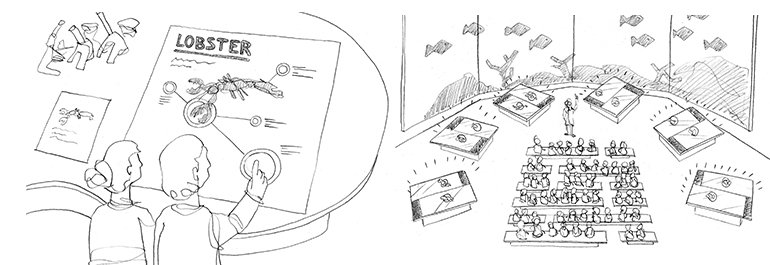New LabVenture on the Horizon
Announcements | Dec 31, 2017
On a chilly fall morning in 2015, CEO and President Don Perkins took to a press conference podium to announce the largest grant in our organization’s history: $6.5 million from NASA to support Real World, Real Science. These funds, distributed to GMRI and project partners, will facilitate the next evolutionary step for our keystone education program, LabVenture.

The grant announcement itself made headlines, but the real work was just about to begin. Our education team has made huge strides in the time since then. Here’s how the project is beginning to take shape.
Our Impact In The News
Gulf of Maine Research Institute lands $6.5 million NASA grant
The Portland center will update and expand its climate change education program for Maine schoolchildren.
Press Herald|Oct 20, 2015
What is Real World, Real Science anyway?
The goal of Real World, Real Science is to help students explore the impacts of climate and weather by combining local stories with NASA data resources. We’ll deliver this new content through our LabVenture program. The next iteration of our classic two-and-a-half-hour experience will focus on the impacts of climate and weather on the Gulf of Maine ecosystem and its key species.
The program is designed to increase students’ data skills and climate knowledge. Data literacy will prepare students to thrive in a 21st century economy, and a better understanding of our climate will prepare them to become the next generation of ocean stewards. An associated suite of classroom activities will help students and teachers carry what they learn in our lab back into their classrooms.
We’ll also extend this learning experience beyond the walls of our lab by partnering with science centers throughout the region. Just like Maine LabVenture participants, visitors to these science centers will use locally relevant NASA data — including sea surface temperature and precipitation records — to learn about the impacts of climate and weather in their own backyards.
Building the Team
To implement this five-year project, our education team welcomed Project Manager Jeff Bate. Jeff works with the teams developing both the technology and the new content for Real World, Real Science.
Jeff is familiar with the processes of scientific inquiry and data analysis, thanks to his years of product management and operations experience for a variety of cleantech companies. He reports to Chief Education Officer Leigh Peake, who holds ultimate accountability for successful delivery of the project.
In addition to education and technology experts at GMRI, we’re engaged with a network of external partners around the country. These partners include:
- Education Development Center (Waltham, MA): EDC will drive the classroom activity development and project evaluation portions of Real World, Real Science.
- Stanford University (Palo Alto, CA): Stanford’s AAALab is a learning research group focused on game-based learning assessments.
- Science Centers: The Maine Discovery Museum (Bangor, ME) and Montshire Museum (Norwich, VT) will help us design locally relevant content and resources for science centers. Then, seven science centers throughout the Northeast will provide feedback and pilot testing of these resources.
- Upswell (Portland, OR): Upswell is an experience design firm that specializes in creating interactive environments with a combination of digital and physical components.
At the end of February, we hosted a meeting for all project partners here at GMRI. That meeting left everyone excited about the work ahead of us this year.

Progress
Like all big projects, the early stages entail a lot of meetings, but the team has already begun building new technology and imagining new content.
The NASA data at the core of Real World, Real Science will not be a one-time, static download. Instead, students will use up-to-date data that is procured and displayed within a new digital platform, which our team is in the process of building.
The content development process is also underway, as the team wrestles with how to best distill a wide range of learning goals into a 2.5-hour experience. We want to make sure the experiences continue to engage and inspire kids, provide a combination of hands-on and virtual experiences, and give kids a sense of the special ecosystem that is the Gulf of Maine.
The look and feel of this new experience is also starting to come into focus. Upswell is responsible for leading the development of the LabVenture interface software, experience production, and updates to the physical space. The physical design will create an immersive and interactive environment to engage kids in small group activities and facilitate larger discussions. Students will interact with content through an interface that combines virtual and tangible components with a focus on using authentic tools of science to guide their inquiry. Concept drawings below reflect some of the early ideas for these updates.

What's Next?
As LabVenture continues its statewide impact here in Maine, our education team is excited about this next evolutionary step. Data skills and climate knowledge are crucial to today’s students, and partners from Palo Alto to Portland, ME are motivated by a shared desire to create a unique experience around these concepts. We’re excited to watch this project come to life.
Every new year brings change, but 2018 will be truly transformative for our cornerstone education program. Next fall, we will unveil a totally updated LabVenture program, featuring new technology and a fully renovated space.
The 10,000 Maine middle schoolers who visit our lab each year will use real-life NASA data to explore the influence of climate change on the Gulf of Maine ecosystem and its key species. They’ll investigate these scientific concepts using state-of-the-art interactive technologies, which the project team is currently prototyping.
"It’s been so exciting to watch the plans for the whole experience emerge over the last year,” said Chief Education Officer Leigh Peake. “It’s been a true labor of love for everyone on the team.”
The current LabVenture program will continue through the end of the 2017-2018 school year, and renovations to the Cohen Center for Interactive Learning will begin shortly thereafter. Once renovations are complete, the education team will pilot the new program in September and resume full activity in October.




